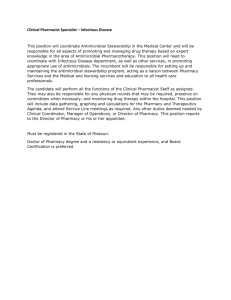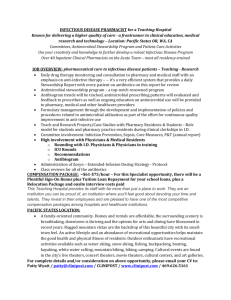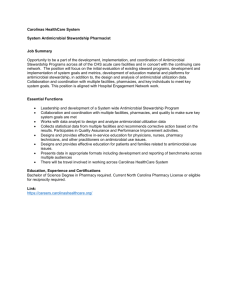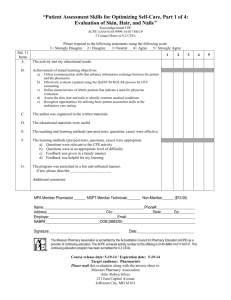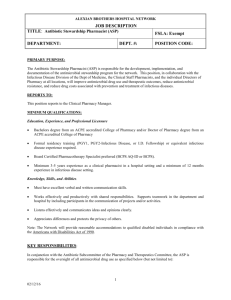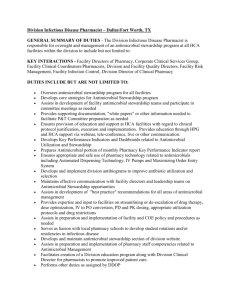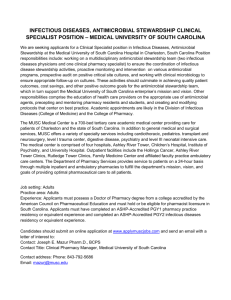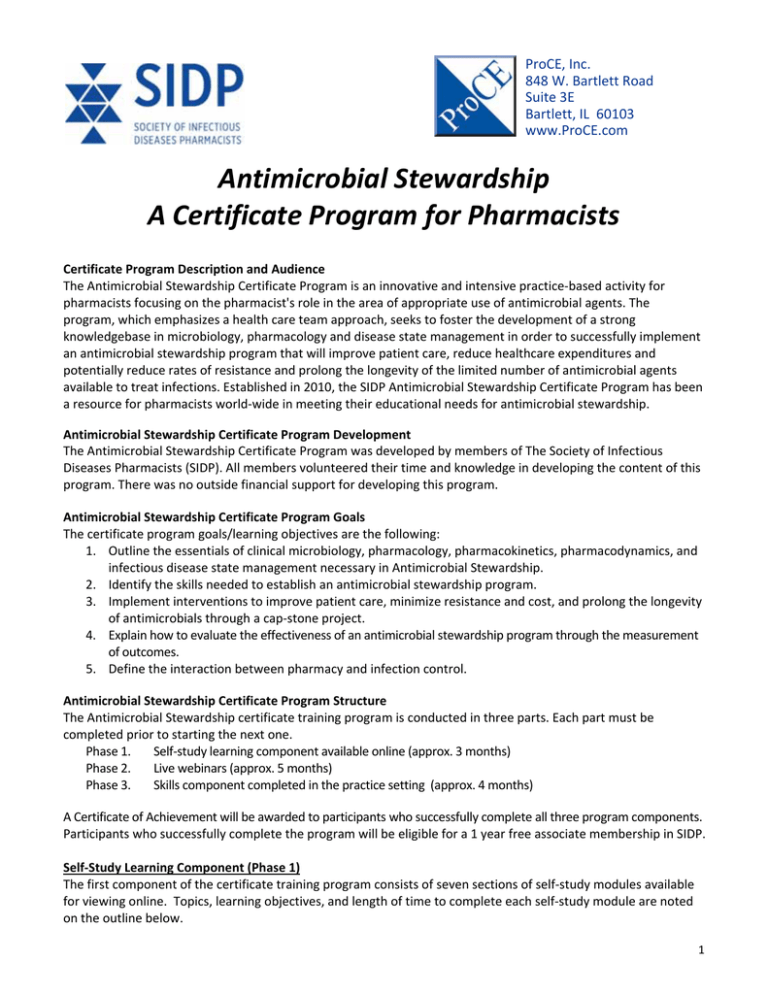
ProCE, Inc.
848 W. Bartlett Road
Suite 3E
Bartlett, IL 60103
www.ProCE.com
Antimicrobial Stewardship
A Certificate Program for Pharmacists
Certificate Program Description and Audience
The Antimicrobial Stewardship Certificate Program is an innovative and intensive practice-based activity for
pharmacists focusing on the pharmacist's role in the area of appropriate use of antimicrobial agents. The
program, which emphasizes a health care team approach, seeks to foster the development of a strong
knowledgebase in microbiology, pharmacology and disease state management in order to successfully implement
an antimicrobial stewardship program that will improve patient care, reduce healthcare expenditures and
potentially reduce rates of resistance and prolong the longevity of the limited number of antimicrobial agents
available to treat infections. Established in 2010, the SIDP Antimicrobial Stewardship Certificate Program has been
a resource for pharmacists world-wide in meeting their educational needs for antimicrobial stewardship.
Antimicrobial Stewardship Certificate Program Development
The Antimicrobial Stewardship Certificate Program was developed by members of The Society of Infectious
Diseases Pharmacists (SIDP). All members volunteered their time and knowledge in developing the content of this
program. There was no outside financial support for developing this program.
Antimicrobial Stewardship Certificate Program Goals
The certificate program goals/learning objectives are the following:
1. Outline the essentials of clinical microbiology, pharmacology, pharmacokinetics, pharmacodynamics, and
infectious disease state management necessary in Antimicrobial Stewardship.
2. Identify the skills needed to establish an antimicrobial stewardship program.
3. Implement interventions to improve patient care, minimize resistance and cost, and prolong the longevity
of antimicrobials through a cap-stone project.
4. Explain how to evaluate the effectiveness of an antimicrobial stewardship program through the measurement
of outcomes.
5. Define the interaction between pharmacy and infection control.
Antimicrobial Stewardship Certificate Program Structure
The Antimicrobial Stewardship certificate training program is conducted in three parts. Each part must be
completed prior to starting the next one.
Phase 1.
Self-study learning component available online (approx. 3 months)
Phase 2.
Live webinars (approx. 5 months)
Phase 3.
Skills component completed in the practice setting (approx. 4 months)
A Certificate of Achievement will be awarded to participants who successfully complete all three program components.
Participants who successfully complete the program will be eligible for a 1 year free associate membership in SIDP.
Self-Study Learning Component (Phase 1)
The first component of the certificate training program consists of seven sections of self-study modules available
for viewing online. Topics, learning objectives, and length of time to complete each self-study module are noted
on the outline below.
1
Module 1 – Microbiology
1a - Staphylococcus species (ACPE UAN: 0221-9999-14-192H01-P, Knowledge-based, 0.5 contact hour, Release:
12/5/2014, Expiration: 12/5/2017)
• Explain the Gram-stain & morphology of various
bacteria
• Discuss commensal flora in the body and where select
organisms are pathogenic
• List agents with activity or should be considered for use
against various organisms
• Discuss resistance issues associated with various
organisms
1b-Streptococcus & Enterococcus (ACPE UAN: 0221-9999-14193-H01-P, Knowledge-based, 0.5 contact hour, Release:
12/12/2014, Expiration: 12/12/2017)
• Explain the Gram-stain & morphology of various
bacteria
• Discuss commensal flora in the body and where select
organisms are pathogenic
• List agents with activity or should be considered for use
against various organisms
• Discuss resistance issues associated with various
organisms
1c-Non Fermenters (ACPE UAN: 0221-9999-15-103-H01-P,
Knowledge-based, 0.5 contact hour, Release: 6/19/2015,
Expiration: 6/19/2018)
• Explain the gram-stain and morphology of
Acinetobacter, Pseudomonas, and Stenotrophomonas
maltophilia
• Discuss the epidemiology of Acinetobacter,
Pseudomonas, and Stenotrophomonas maltophilia
• List agents with activity or should be considered for use
against Acinetobacter, Pseudomonas, and
Stenotrophomonas maltophilia
• Discuss resistance issues associated with Acinetobacter,
Pseudomonas, and Stenotrophomonas maltophilia and
the roll of combination therapy
1d-Enterobacteriaciae (ACPE UAN: 0221-9999-14-195-H01-P,
Knowledge-based, 0.5 contact hour, Release: 12/12/2014,
Expiration: 12/12/2017)
• Discuss commensal flora in the body and where select
organisms are pathogenic
• List agents with activity or should be considered for use
against various gram-negative bacilli
• Discuss resistance issues associated with various
organisms
1e-Haemophilus, Moraxella, Neisseria, Atypical Organisms
(ACPE UAN: 0221-9999-14-196-H01-P, Knowledge-based, 0.5
contact hour, Release: 12/12/2014, Expiration:
12/12/2017)
• Explain the gram-stain and morphology of various
bacteria.
• Discuss commensal flora in the body and where select
organisms are pathogenic.
• Explain the various types of infections.
• List agents with activity or should be considered for use
against various organisms.
• Discuss resistance issues associated with various
organisms.
1f-Anaerobes (ACPE UAN: 0221-9999-14-197-H01-P,
Knowledge-based, 0.5 contact hour, Release: 12/12/2014,
Expiration: 12/12/2017)
• Explain the gram-stain and morphology of various
bacteria
• Discuss commensal flora in the body and where select
organisms are pathogenic
• Explain the various types of infections
• List agents with activity or should be considered for use
against various organisms
• Discuss resistance issues associated with various
organisms
1g-Fungi (ACPE UAN: 0221-9999-14-198-H01-P, Knowledgebased, 0.5 contact hour, Release: 12/5/2014, Expiration:
12/5/2017)
• Recognize the differences between yeasts, molds, and
dimorphic fungi
• Describe the activity of antifungals against key fungal
pathogens
• Discuss challenges that are inherent to antifungal
pharmacotherapy
Module 2 – Pharmacology
2a-Antimicrobial Pharmacology I (ACPE UAN: 0221-9999-14199-H01-P, Knowledge-based, 0.75 contact hour, Release:
12/12/2014, Expiration: 12/12/2017)
• Explain the principals of anti-infective pharmacology
• Describe the classifications of anti-infectives including
mechanisms of action, mechanisms of resistance,
spectrum of activity, infections commonly treated,
adverse effects (most common, very serious or unique),
and drug interactions
• Select and discuss rationale for drugs of choice for
various organisms
2b-Antimicrobial Pharmacology II (ACPE UAN: 0221-9999-14200-H01-P, Knowledge-based, 1.0 contact hour, Release:
12/12/2014, Expiration: 12/12/2017)
• Explain the principals of anti-infective pharmacology
• Describe the classifications of anti-infectives including
mechanisms of action, mechanisms of resistance,
spectrum of activity, infections commonly treated,
adverse effects (most common, very serious or unique),
and drug interactions
• Select and discuss rationale for drugs of choice for
various organisms
2c-Antimicrobial Pharmacology III (ACPE UAN: 0221-9999-14201-H01-P, Knowledge-based, 0.5 contact hour, Release:
12/12/2014, Expiration: 12/12/2017)
• Explain the principals of anti-infective pharmacology
• Describe the classifications of anti-infectives including
mechanisms of action, mechanisms of resistance,
spectrum of activity, infections commonly treated,
2
adverse effects (most common, very serious or unique),
and drug interactions
• Select and discuss rationale for drugs of choice for
various organisms
Module 3 – Pharmacokinetics/Pharmacodynamics
3a-Pharmacokinetics Primer for Clinicians (ACPE UAN: 02219999-14-202-H01-P, Knowledge-based, 0.75 contact hour,
Release: 11/24/2014, Expiration: 11/24/2017)
• Describe pharmacokinetics (PK) and the clinical
application of PK parameters in daily clinical practice.
• Describe physiologic factors and disease states that
affect drug disposition throughout the body.
3b-Introduction to Antimicrobial Pharmacodynamics (ACPE
UAN: 0221-9999-14-203-H01-P, Knowledge-based, 1.0
contact hour, Release: 11/24/2014, Expiration:
11/24/2017)
• Discuss pharmacodynamics (PD) and the basic laws
governing its application into clinical practice.
• Discuss the various in vitro, in vivo, and clinical testing
methodologies used to derive PD breakpoints.
• Demonstrate knowledge of the PD parameters that
optimize the efficacy of each antimicrobial agent and
the published data used to derive the currently
accepted PD breakpoints.
• Describe Monte Carlo Simulation (MCS), the rationale
behind performing this analysis, interpretation of the
results, and the limitations associated with these
analyses.
3c-Applied Antimicrobial Pharmacodynamics (ACPE UAN:
0221-9999-14-204-H01-P, Knowledge-based, 0.75 contact
hour, Release: 12/12/2014, Expiration: 12/12/2017)
• Describe Monte Carlo simulation (MCS), the rationale
behind performing this analysis, interpretation of the
results, and the limitations associated with these
analyses.
• Provide examples that correlate data generated from
MCS analyses and clinical outcome data generated
from real patients.
• Evaluate unconventional dosing strategies used to
maximize the pharmacodynamics (PD) of currently
available antimicrobials.
3d-Antifungal pharmacodynamics (ACPE UAN: 0221-9999-14205-H01-P, Knowledge-based, 0.5 contact hour, Release:
10/6/2014, Expiration: 10/6/2017)
• Describe pharmacokinetics (PK) and the clinical
application of PK parameters in daily clinical practice.
• Describe physiologic factors and disease states that
affect drug disposition throughout the body.
• Discuss pharmacodynamics (PD) and the basic laws
governing its application into clinical practice.
• Discuss the various in vitro, in vivo, and clinical testing
methodologies used to derive PD breakpoints.
• Demonstrate knowledge of the PD parameters that
optimize the efficacy of each antimicrobial agent and
the published data used to derive the currently
accepted PD breakpoints.
•
•
Evaluate unconventional dosing strategies used to
maximize the PD of currently available antimicrobials.
Examine the rationale supporting therapeutic drug
monitoring for available antifungal agents.
Module 4 – Disease States and Treatments
4a-Bone & Joint Infections (ACPE UAN: 0221-9999-15-075H01-P, Knowledge-based, 1.0 contact hour, Release:
3/13/2015, Expiration: 3/13/2018)
• Categorize joint infections - septic arthritis and
prosthetic joints
– Identify patient presenting symptoms.
– List common causative organisms
– Describe correlation with osteomyelitis.
– Define appropriate antimicrobial therapy.
• Differentiate classifications of osteomyelitis hematogenous and contiguous osteomyelitis
– List common causative organisms.
– Suggest appropriate antimicrobial regimens for
each category.
– Identify criteria and appropriate candidates for oral
therapy
4bc-Lower Respiratory Tract Infections (ACPE UAN: 02219999-14-208-H01-P, Knowledge-based, 3.0 contact hours,
Release: 10/6/2014, Expiration: 10/6/2017)
• Review the national guideline recommendations for
community-acquired (CAP), healthcare-associated
(HCAP), hospital-acquired (HAP), and ventilatorassociated (VAP) pneumonia
• List the most common bacterial pathogens associated
with CAP, HAP, VAP, and HCAP
• Identify 5 risk factors for multidrug-resistant pathogens
• Discuss selection of empiric therapy and de-escalation
for CAP, HCAP, HAP, and VAP
• Describe the role for antimicrobial stewardship in
ensuring optimal management of pneumonia
4d-Skin/Soft Tissue Infections (ACPE UAN: 0221-9999-14-209H01-P, Knowledge-based, 0.5 contact hour, Release:
12/12/2014, Expiration: 12/12/2017)
• Describe pathophysiology / predisposing factors for
skin/soft tissue infections (SSTIs).
• Recognize clinical presentation and monitoring
considerations
• List primary pathogens associated with skin and soft
tissue infections.
• Discuss appropriate antimicrobial therapy for SSTIs.
4e-Clostridium difficile Infection (ACPE UAN: 0221-9999-14210-H01-P, Knowledge-based, 1.5 contact hours, Release:
10/6/2014, Expiration: 10/6/2017)
• Explain why CDI is a burden in both inpatient and
outpatient settings.
• Identify major risk factors for CDI.
• Discuss rational approaches to the management of
initial and recurrent symptomatic CDI.
• Compare and contrast strategies for preventing CDI.
3
4f-Management of Sepsis (ACPE UAN: 0221-9999-14-211H01-P, Knowledge-based, 0.5 contact hour, Release:
10/6/2014, Expiration: 10/6/2017)
• Differentiate between systemic inflammatory response
syndrome (SIRS), sepsis, severe sepsis, and septic shock.
• Describe and sequence the following interventions in
the order they should be generally
considered/implemented in the management of septic
shock: antimicrobial therapy, fluid resuscitation, stress
ulcer prophylaxis, glucose control, initiation of
vasopressors, and anti-thrombosis
4g-Management of Invasive Candidiasis (ACPE UAN: 02219999-14-212-H01-P, Knowledge-based, 0.5 contact hour,
Release: 10/6/2014, Expiration: 10/6/2017)
• Recommend an appropriate antifungal agent for a
patient based on the species of Candida identified.
• Select the appropriate antifungal agent for a patient
with candidiasis based on the pharmacokinetic, toxicity,
and drug interaction profiles of the agents.
4h-Bacterial Endocarditis (ACPE UAN: 0221-9999-14-213-H01P, Knowledge-based, 0.5 contact hour, Release: 12/12/2014,
Expiration: 12/12/2017)
• Review the pathophysiology of endocarditis
• Identify endocarditis risk factors and the bacteria
associated with each
• Recommend antibiotic therapy based on both empiric
and culture confirmed microbiology data
4i-Meningitis (ACPE UAN: 0221-9999-14-214-H01-P,
Knowledge-based, 0.75 contact hour, Release: 12/5/2014,
Expiration: 12/5/2017)
• Review the epidemiology and microbiology of meningitis
• Describe the clinical presentation and diagnosis of
meningitis
• Select appropriate antibiotic therapy for meningitis
based on risk factors and the presumptive or culture
confirmed microorganism
• Identify options for the prevention of meningitis
4j-Intravascular Catheter-Related Blood Stream Infections
(ACPE UAN: 0221-9999-14-215-H01-P, Knowledge-based, 1.0
contact hour, Release: 11/24/2014, Expiration:
11/24/2017)
• Design an appropriate empiric treatment regimen for a
patient with a suspected catheter-related blood stream
infection (CRBSI) based on patient-specific risk factors.
• Develop a definitive treatment plan for CRBSIs caused by
various common pathogens.
• Determine when catheter removal is an essential
element of the treatment plan for treating a specific
CRBSI.
4k-Intra-Abdominal Infections (ACPE UAN: 0221-9999-14-216H01-P, Knowledge-based, 0.75 contact hour, Release:
12/5/2014, Expiration: 12/5/2017)
• List the common pathogens associated with primary,
secondary, and tertiary peritonitis
• Design appropriate empiric treatment regimens for
common intra-abdominal infections
4l-Urinary Tract Infections (ACPE UAN: 0221-9999-14-217H01-P, Knowledge-based, 0.75 contact hour, Release:
11/24/2014, Expiration: 11/24/2017)
• Describe and define Urinary tract infections associated
in the hospital setting
• Describe the epidemiology, microbiology and treatment
of acute pyelonephritis, catheter associated UTI and
asymptomatic bacteriuria
Module 5 - Interventions
(ACPE UAN: 0221-9999-14-218-H01-P, Knowledge-based, 1.5
contact hours, Release: 12/12/2014, Expiration:
12/12/2017)
• Describe the benefits and process of de-escalation
interventions.
• Review data suggesting when shorter durations of
antimicrobial therapy may be appropriate.
• Introduce the concept of rapid laboratory testing
methods as an aid to antimicrobial stewardship
interventions
Module 6 – Measuring Outcomes
(ACPE UAN: 0221-9999-14-219-H01-P, Knowledge-based, 2.25
contact hours, Release: 11/24/2014, Expiration: 11/24/2017)
Clinical Outcomes
• Identify the types of adverse drug events associated
with indiscriminant antibiotic usage.
• List variables of interest that Stewardship Programs can
impact and quantify.
• Categorize the types of studies utilized in measuring
outcomes of Antimicrobial Stewardship Programs.
• Identify candidates for IV to PO conversion.
Economical Outcomes
• Compare and contrast different ways to present
economical outcomes from a Stewardship Program.
• Determine the most appropriate economical outcomes
to evaluate for a Stewardship Program.
Resistance Outcomes
• Describe the utility of measuring resistance for
Antimicrobial Stewardship.
Prioritization of program components
• Discuss the common elements of stewardship programs.
• Prioritize program components based on available
resources for smaller vs. larger institutions.
Module 7 – Infection Control
(ACPE UAN: 0221-9999-14-184-H01-P, Knowledge-based, 0.5
contact hour, Release: 7/28/2014, Expiration: 7/28/2017)
• Discuss the goals of infection control programs and the
types of infection prevention efforts that are often
employed.
• Indicate which types of Multiple Disease Resistant
Organism (MDRO) infections are frequently identified in
small hospitals.
• Describe a small hospital Infection Control program.
4
Live Webinar Sessions (Phase 2)
The second component of the certificate training program consists of completing a minimum of four of the six live
webinar sessions (1.5 hours each) listed below. You may also attend all six live webinars and receive additional
continuing pharmacy education credit for the other two topics. The live webinars will be offered quarterly and
times for all sessions will be viewable after all Self-Study content is completed. We reserve the right to cancel a
live webinar. In the event of a live webinar cancellation, each participant will be notified via e-mail along with the
rescheduled date. Topics and learning objectives for each live webinar session are:
I. Implementation of an Antimicrobial Stewardship Program: Justification, Cost, and Challenges
(ACPE UAN: 0221-9999-15-265-L04-P Knowledge-based, Release: 10/15/2015, Expiration: 10/15/2018)
• Describe the resources necessary to initiate an antimicrobial stewardship program.
• Identify potential financial and institutional barriers to implementation of an antibiotic stewardship program.
• Describe how to justify the benefits of an antimicrobial stewardship program to administrative and clinical
leadership.
II. Understanding the Hospital Antibiogram
(ACPE UAN: 0221-9999-15-266-L04-P Application-based, Release: 10/15/2015, Expiration: 10/15/2018)
• List the CLSI M39 guidelines for antibiogram development
• Discuss how to utilize a hospital antibiogram to guide empiric antibiotic selection and to detect bacterial
resistance patterns
• Discuss how rates of MRSA, VRE, and other resistant organisms can be calculated using antibiogram data
• Describe how individual and hospital antibiograms may be used to foster prudent antimicrobial prescribing
and optimize antimicrobial stewardship
III. Multidrug Resistant Organisms: Detection, Epidemiology, and Management
(ACPE UAN: 0221-9999-15-267-L01-P Knowledge-based, Release: 10/15/2015, Expiration: 10/15/2018)
• Discuss the mechanisms of resistance behind common multidrug resistant (MDR) pathogens.
• Describe the microbiology challenges associated with the identification of multidrug-resistant bacteria.
• Discuss the prevalence and epidemiology of multidrug resistant bacteria.
• Describe the current evidence-based strategies in the management of invasive multidrug resistant bacteria.
IV. Antimicrobial Stewardship and Microbiology: Focus on Rapid Diagnostic Tests
(ACPE UAN: 0221-9999-15-268-L04-P Knowledge-based, Release: 10/15/2015, Expiration: 10/15/2018)
• Discuss the various rapid diagnostic technologies
• Evaluate the use of rapid diagnostic technologies on patient outcomes
• Determine considerations during the pre-implementation, implementation, and post-implementation phases
of rapid diagnostic technologies
V. Computer Support Systems and Technology in an Antimicrobial Stewardship Program
(ACPE UAN: 0221-9999-15-269-L04-P Knowledge-based, Release: 10/15/2015, Expiration: 10/15/2018)
• Discuss the role of computerized physician order entry in a stewardship program.
• Identify the different clinical decision support systems and their limitations.
• Describe information technology specialist role on the antimicrobial stewardship team.
VI. Optimizing Infectious Disease Outcomes in an Antimicrobial Stewardship Program
(ACPE UAN: 0221-9999-15-270-L04-P Knowledge-based, Release: 10/15/2015, Expiration: 10/15/2018)
• Discuss the impact of antimicrobial therapy and resistance on clinical outcomes
• Review components of antimicrobial stewardship programs and opportunities to improve patient care
• Recognize dosing strategies to optimize antimicrobial pharmacodynamics
• Describe the development of evidence-based guidelines to implement clinical pathways
• Outline novel concepts of antibiotic heterogeneity to address gram negative resistance
5
Skills Component in the Practice Setting
(ACPE UAN: 0221-9999-15-271-H04-P Application-based; 10 contact hours, Release: 10/15/2015, Exp: 10/15/2018)
After completion of the self-study and live webinars, the participant is required to implement some aspect of
antimicrobial stewardship at their facility. The participant should notify SIDP, in writing, of the implementation
approximately 4 months after completion of the last live webinar. A panel will review the document and evaluate
it for appropriateness within antimicrobial stewardship. If modifications are needed, SIDP will return the
document with review comments for change and the participant will have 2 months to resubmit a modified
document. After approval by the panel of the required documentation, an overall program evaluation must be
completed online. A CE statement of completion for 10 hours of CE will be issued online and a certificate of
completion of SIDPs accredited Antimicrobial Stewardship Program will be sent to the participant. If a time
extension is needed, please submit the request in writing via email to info@proce.com. The request for extension
will be reviewed and an email will be returned to you as to whether the extension was granted.
The learning objectives are the following:
• Implement at least one aspect of antimicrobial stewardship within your practice setting.
• Construct a documentation plan for an antimicrobial stewardship project.
• Identify barriers to implementing components of an antimicrobial stewardship project.
• Outline strategies to overcome barriers identified for an antimicrobial stewardship project.
Accreditation Statement and Continuing Education Credit
Practice Activity Number 0221-9999-15-073-B01-P
Initial Date of Release: March 15, 2015 | Date of Expiration: March 15, 2018
This CE activity is jointly provided by ProCE, Inc. and SIDP. ProCE is accredited by the Accreditation Council
for Pharmacy Education as a provider of continuing pharmacy education. ACPE Practice Activity Number
0221-9999-15-073-B01-P has been assigned to this practice-based CE activity (initial release date 3-15-15).
This CE activity is approved for 40.0 contact hours (4.0 CEUs) in states that recognize ACPE providers. The
participant can elect to complete two additional webinars at no additional cost and earn 43.0 contact hours (4.3 CEUs).
Statements of completion will be issued online as individual modules are completed with a post-test score of 80% or
higher and completion of an online evaluation. UANs for the individual activity modules are listed above.
The self-study component is 24 contact hours or 2.4 CEUs of continuing pharmacy education credits. Statements of
completion will be issued online upon completion of the activity evaluations and the post-tests with a score of 80% or
higher. It is anticipated the participant will complete this component within 3 months of registration. Content and CE
hours are subject to change: modules are regularly reviewed and updated to reflect current clinical knowledge.
The live webinar component will result in 6 to 9 contact hours of continuing pharmacy education credit (0.6 to 0.9
CEUs). Statements of completion will be issued online upon completion of the activity evaluations and passing the posttests with a grade of 80% or higher for each of the live webinar sessions. It is anticipated the participant will complete
this component within 8 months of registration.
A practice or skills component will be completed at your practice setting after completion of the home study
component and at least four live webinars. This portion is worth 10 hours or 1.0 CEUs of continuing pharmacy
education credit. This component consists of implementation of some aspect of antimicrobial stewardship at your
facility. This could be an IV to PO switch program, development and clinical incorporation of an antibiogram, criteria for
use, clinical protocol to treat one or multiple infectious diseases, etc. The information must be submitted either by
email to info@proce.com or mail to:
SIDP c/o ProCE, Inc.
848 W. Bartlett Rd, Ste 3E
Bartlett, IL 60103
After approval by SIDPs panel of the required documentation, a final program evaluation must be completed online to
receive CE credit. It is anticipated the participant will complete this component within 12 months of registration, or 14
months of registration if project modifications are needed.
6
Participants will have access to the content for one year after purchasing the program, unless an extension is granted.
Antimicrobial Stewardship Certificate of Completion
Upon successful completion of all three components, a Certificate of Achievement will be issued to the participant from
The Society of Infectious Diseases Pharmacists. The certificate will be mailed directly to participants 2-4 weeks following
completion of the program. Participants who successfully complete the program will also be eligible for a 1 year free
associate membership in SIDP.
Program Cost
Participant cost is $750 per pharmacist. This amount includes the self-study section, up to six live webinars, and the
skills development/implementation at your practice site. For trainees (e.g., residents, fellows, and graduate students)
the cost will be $550 per individual. For institutions or healthcare facilities with payment from the same institution, we
provide the following discounts:
6-10 healthcare professionals = 5% discount
11-15 healthcare professionals = 10% discount
More than 15 healthcare professionals = 15% discount
If you wish to participate in only a portion of the Program, Phase 1 is available for $500 per pharmacist. Phases 1 and 2
are available for $688 per pharmacists. The above discounts apply for multiple healthcare professionals.
Cancellations received in writing prior to accessing any of the program content (fax: 630-540-2849 or e-mail
info@proce.com) will receive a full refund minus a $150 cancellation fee.
Hardware/Software Requirement
PC: Microsoft Windows 7 or above
MAC: Mac OS X
Internet Explorer (v9 or greater), Firefox, or Chrome
Chrome or Firefox
Adobe Acrobat Reader
Adobe Acrobat Reader
Sound Card and Speakers
Sound Card and Speakers
800 x 600 Minimum Monitor Resolution (1024 x 768 Recommended)
Flash Player Plug-in, Current Version
Flash Player Plug-in, Current Version
JavaScript
JavaScript, Java 1.6 or higher
Contact for Technical support or CE questions: ProCE, Inc., e-mail info@proce.com or phone: 630-540-2848.
Conflict of Interest Disclosure
The Conflict of Interest Disclosure Policy of ProCE, Inc. requires faculty participating in a continuing pharmacy
education activity to disclose any relationship(s) with a pharmaceutical, product or device company. Faculty
disclosing relationships proven to create a conflict of interest with regard to their contribution to the activity will not
be permitted to present. Faculty are also required to disclose during their presentation when discussing any
unlabeled or investigational use of any commercial product or device not yet approved for use in the United States.
Faculty
John W. Ahern, Pharm.D.
Pharmacist Clinician-Infectious Disease
Pharmacy Department, Fletcher Allen Health Care
Burlington, VT
No conflict of interest reported
Ronda L. Akins, Pharm.D.
Clinical Specialist - Infectious Diseases
Methodist Charlton Medical Center
Dallas, TX
Received grant/research support from Cerexa, Inc.
Edina Avdic, Pharm.D., MBA, BCPS-ID
Clinical Pharmacist, Infectious Diseases
Associate Director, Antimicrobial Stewardship Program
The Johns Hopkins Hospital,
Baltimore, MD
Co-Investigator in grant supported by Pfizer and Joint
Commission
Harrison Bachmeier, Pharm.D., BCPS
Clinical Pharmacist
Lee Memorial Health System
Fort Myers, FL
No conflict of interest reported
7
Karri A. Bauer, Pharm.D., BCPS {AQ-ID}
Speciality Practice Pharmicist Infectious Diseases
The Ohio State University Wexner Medical Center
Columbus, OH
Received grant/research support from Cepheid, Cubist and
Merck. Consultant/speakers bureau for Astellas, Merck and
Forest
James R. Beardsley, Pharm.D., BCPS
Assistant Director of Pharmacy
Wake Forest Baptist Medical Center
Winston-Salem, NC
No conflict of interest reported
David Burgess, Pharm.D., FCCP
Professor and Chair, Pharmacy Practice and Science
University of Kentucky College of Pharmacy
Lexington, KY
No conflict of interest reported
Elizabeth Dodds Ashley, Pharm.D., MHS, FCCP, BCPS
Associate Director of Clinical Pharmacy Services
University of Rochester Medical Center
Rochester, NY
Consultant/speakers bureau for Pfizer, Ortho-McNeil and
Merck
Sharon Erdman, Pharm.D.
Clinical Professor of Pharmacy Practice, College of
Pharmacy at Purdue University
Adjunct Professor, School of Medicine at Indiana University
Infectious Diseases Clinical Pharmacist, Wishard Health Svcs
Indianapolis, IN
Member of the CLSI Working Group on Antibiogram
Development
Jason C. Gallagher, Pharm.D., FCCP, BCPS
Professor
Temple University
Philadelphia, PA
Received grant/research support from Merck.
Consultant/speakers bureau for Astellas, Optimer and
Forest
Alan Gross, Pharm.D., BCPS
Infectious Diseases Pharmacist, University of Illinois
Hospital & Clinical Assistant Professor, Pharmacy Practice
University of Illinois at Chicago College of Pharmacy
Chicago, IL
No conflict of interest reported
Elizabeth D. Hermsen, Pharm.D., MBA, BCPS-ID
Clinical Outcomes Research Director
Cubist Pharmaceuticals
Omaha, NE
Employee of Cubist Pharmaceuticals
Rupali Jain, Pharm.D., BCPS
Clinical Associate Professor, School of Pharmacy
Antimicrobial Stewardship
University of Washington
Seattle, WA
No conflict of interest reported
Meghan N. Jeffres, Pharm.D., BCPS
Assistant Professor, Department of Clinical Pharmacy
University of Colorado Skaggs School of Pharmacy and
Pharmaceutical Sciences
Aurora, CO
Received grant/research support from Pfizer.
Consultant/speakers bureau for Cubist
Alice M. Jenh Hsu, Pharm.D., BCPS, AQ-ID
Clinical Pharmacy Specialist, Pediatric Infectious Diseases
The Charlotte R. Bloomberg Children's Center at The Johns
Hopkins Hospital
Baltimore, MD
No conflict of interest reported
Scott E. Kinkaid, Pharm.D., BCPS
Clinical Coordinator of Internal Medicine, UK HealthCare
Adjunct Assistant Professor, University of Kentucky College
of Pharmacy
Lexington, KY
No conflict of interest reported
David W. Kubiak, Pharm.D., BCPS {AQ-ID}
Infectious Diseases Clinical Specialist
Brigham & Women’s Hospital
Boston, MA
No conflict of interest reported
Joseph L. Kuti, Pharm.D.
Associate Director, Clinical and Economic Studies
Center for Anti-Infective Research & Development
Hartford Hospital
Hartford, CT
No conflict of interest reported
Russell Lewis, Pharm.D., FCCP, BCPS
Associate Professor, Department of Medical Sciences and
Surgery
Alma Mater Studiorum Università di Bologna
Clinical Pharmacologist-Infectious Diseases Unit, S.OrsolaMalpighi Hospital
Bologna, Italy
Received grant/research support from Merck, Gilead, and
Pfizer
Thomas P. Lodise, Pharm.D., Ph.D.
Associate Professor, Pharmacy Practice
Albany College of Pharmacy and Health Sciences
Albany, NY
Received grant/research support from Forest and Cubist.
Consultant/speakers bureau for Forest and Cubist
8
Ben M. Lomaestro, Pharm.D.
Senior Clinical Pharmacy Specialist in Infectious Diseases
Albany Medical Center Hospital
Albany, NY
Consultant/speakers bureau for Optimer, Pfizer
Boris Nogid, Pharm.D., BCPS {AQ-ID}
Medical Science Liaison
Theravance Biopharma
South San Francisco, CA
No conflict of interest reported
Conan MacDougall, Pharm.D., M.A.S., BCPS
Associate Professor of Clinical Pharmacy
University of California San Francisco School of Pharmacy
Clinical Pharmacist, Infectious Diseases, University of
California San Francisco Medical Center
San Francisco, CA
No conflict of interest reported
Amy Pakyz, Pharm.D., MS
Associate Professor
Virginia Commonwealth University School of Pharmacy
Richmond, VA
Received grant/research support from Cubist.
Consultant/speakers bureau for Optimer.
Karl Madaras-Kelly, Pharm.D., M.P.H.
Professor, College of Pharmacy
Idaho State University
Boise, ID
No conflict of interest reported
Craig Martin, Pharm.D., BCPS-ID
Associate Professor, Pharmacy Practice and Science
University of Kentucky College of Pharmacy
Lexington, KY
No conflict of interest reported
Dorothy McCoy, Pharm.D., BCPS-ID
Clinical Associate Professor, Ernest Mario School of
Pharmacy
Clinical Pharmacist, Infectious Diseases
Hackensack University Medical Center
Piscataway, NJ
No conflict of interest reported
Mary Peace McRae, Pharm.D., PhD, BCPS
Department of Pharmacotherapy and Outcomes Science
Virginia Commonwealth University School of Pharmacy
Richmond, VA
No conflict of interest reported
Michael D. Nailor, Pharm.D., BPCS-ID
Clinical Associate Professor, University of Connecticut
School of Pharmacy
Infectious Diseases Clinical Specialist, Hartford Hospital
Hartford, CT
Received grant/research support from Merck.
Consultant/speakers bureau for Astellas and Forest
Natasha N. Pettit, Pharm.D., BCPS, AQ-ID
Clinical Pharmacy Specialist, Infectious Diseases
University of Chicago Medicine
Chicago, IL
No conflict of interest reported
Michael Postelnick, RPh, BCPS-ID
Clinical Coordinator, Department of Pharmacy
Northwestern Memorial Hospital
Chicago, IL
No conflict of interest reported
Jessica Robinson, Pharm.D., BCPS
Assistant Professor of Pharmacy Practice
University of Charleston School of Pharmacy
Charleston, WV
No conflict of interest reported
Marc H. Scheetz, Pharm.D., MSc, BCPS-ID
Assistant Professor of Pharmacy Practice, Midwestern
University Chicago College of Pharmacy
Infectious Diseases Pharmacist, Northwestern Memorial
Hospital
Chicago, IL
No conflict of interest reported
Marisel Segarra-Newnham, Pharm.D., MPH, FCCP, BCPS-ID
Clinical Pharmacy Specialist, Infectious Diseases/HIV
Veterans Affairs Medical Center
West Palm Beach, FL
No conflict of interest reported
Copyright Information
©2015 The Society of Infectious Diseases Pharmacists. All rights reserved. No part of this program may be used or
reproduced in any manner whatsoever without written permission except in the case of brief quotations
embedded in articles or reviews.
9
Antimicrobial Stewardship Certificate Program Registration Form
If you cannot complete payment online complete this form and mail it along with payment to:
SIDP c/o ProCE, Inc., 848 W. Bartlett Rd., Suite 3E, Bartlett, IL 60103
Please print or type: (One form per person)
First Name:
Middle Initial:
Last Name:
Work Home
Address:
City:
State:
Zip:
Place of Employment:
Home Phone:
Work Phone:
E-mail:
Program Fee per Participant: Pharmacist $750
For trainees (e.g., residents, fellows, and graduate students) the cost will be $550 per individual. For institutions
or healthcare facilities with payment from the same institution, we provide the following discounts:
6-10 healthcare professionals = 5%
More than 15 healthcare professionals = 15% discount
11-15 healthcare professionals = 10%
The self-study material will be accessible upon receipt of your registration fee. Directions to access the selfstudy materials will be e-mailed upon receipt of the registration form.
If you wish to participate in only a portion of the Program, Phase 1 is available for $500 per person. Phases 1 and 2 are available for $688
per person. The above discounts apply for multiple healthcare professionals.
Cancellations received in writing prior to accessing any of the program content (fax: 630-540-2849 or e-mail
info@proce.com) will receive a full refund minus a $150 cancellation fee.
Payment Information
Individual Pharmacist ($750)
Trainee ($550 - validation required)
Multiple Pharmacists #________ (Provide contact information as requested above for each participant)
Payment by check (Make check payable to ProCE, Inc.): Check #: ____________
Payment by Credit Card:
Visa
MasterCard
Discover
Amount: $___________
American Express
Card Number:
Expiration Date:
Card ID #/Security Code:
Name on Card:
Signature:
Billing Information (if different than above)
Address
City:
__________
State:
ProCE, Inc. 848 W. Bartlett Rd., Ste 3E Bartlett, IL 60103
630-540-2848 Fax: 630-540-2849 info@proce.com www.proce.com
Zip: ___________

